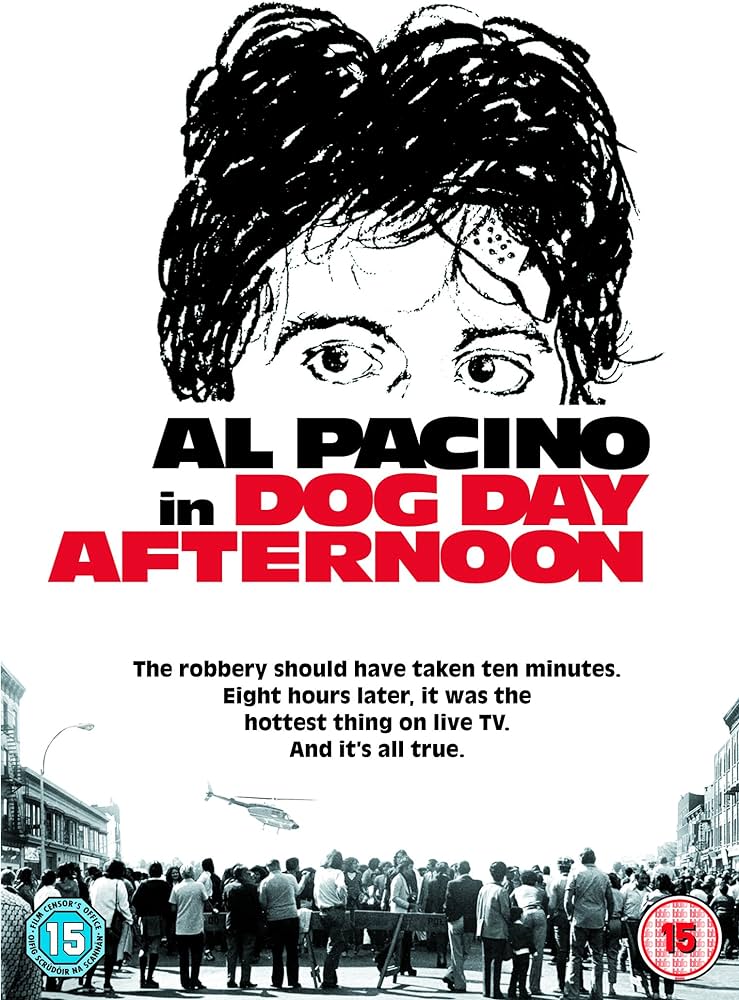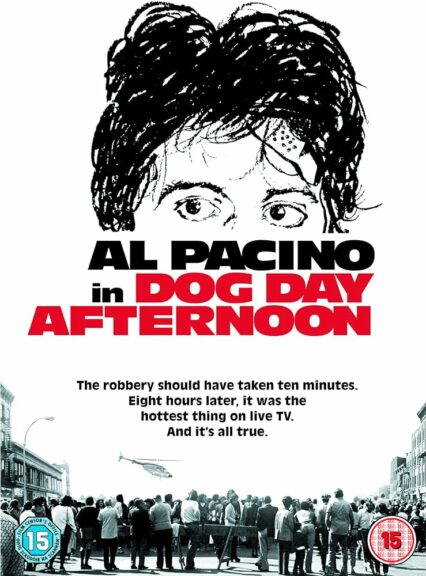
On a summer’s day in Brooklyn, three criminals enter a bank to rob it. The first changes his mind and leaves as soon as the robbery begins. Sonny and Sal are left with the little money they have in the bank. Their robbery degenerates and they find themselves besieged by the police.
The origin: a true story of John Wojtowicz and Ernest Aron. A bank robbery, a gay romance, penniless guys… It’s hardly surprising that American director Sidney Lumet took this astonishing true story and turned it into a two-hour film knowingly named Dog day afternoon.
This expression, used by the Anglo-Saxons, refers to a very hot day. It was a very hot afternoon on August 22, 1972, when Sonny Wortzik and his two accomplices decided to rob a small New York bank. Once inside, events take a completely different turn: Sonny (Al Pacino) and his friend Sal Naturile (John Cazale) find themselves alone, while their third companion scurries off, and realize that the security guards had collected the money earlier in the morning, leaving the bank empty. Passers-by quickly notify the police, and Lumet quickly sets the scene. The two bank robbers, trapped, do not leave the perimeter until the film’s final minutes, and neither do the viewers. A sense of confinement is created, which becomes increasingly oppressive as the film progresses, thanks to a variety of storytelling techniques.
First, the sweltering heat, inside and out; inside the bank, there’s no air-conditioning, while outside, the sun burns. Sonny sweats. A double symbol, since the collective imagination often associates this gesture with growing tension. The drops of sweat become subject to a different interpretation. Then there are the ever-tighter shots, which gradually isolate Sonny and Sal, showing their disarray and unease up close. The film opens with wide shots of New York, underscoring the banality of an August day, but the viewer soon finds himself imprisoned among the artificial lights of the bank and the crackling flashes of curious photographers.
This technique of confinement aims to expose a revealing microcosm in order to bring out the psychological complexity of the characters, while ignoring the superfluous. Lumet, a master of this technique, also uses it in 12 Angry Men, a major work in his filmography.
The characters play a key role in the film, Sonny in particular. Sonny, anything but a stick-up man, is a family man who can’t stand his wife, to the point of physically threatening her. He struggles to make himself understood, with the impression that the whole world can’t hear him. This sense of incomprehension is reflected in the dialogues between Sonny, the police chief (Charles Durning) and the media. On the one hand, a robber who exudes disarray and amateurism; on the other, the colossal resources deployed by the forces of law and order (including hundreds of police officers and a helicopter), the sensationalist media and voyeuristic passers-by, ready to do anything to get in front of the cameras.
Through this glaring imbalance, Lumet denounces consumerism, the society of show business and the contempt and indifference of the American working class. More than just a heist gone wrong, Dog Day Afternoon is a true staging of social drama.
Even more so when the main character turns out to be homosexual. Sonny loves Leon (Chris Sarandon), a man he married some time ago. In fact, he robbed the bank to pay for her sex-change operation. This revelation, which takes place halfway through the film, is a real turning point, lending a relatively modern approach to the feature. While the Stonewall riots of 1969 led to the emergence of gay and lesbian collectives, questions of sexual identity and orientation were still far from being part of American mores.
Without considering the filmmaker’s choice to be committed, it can nonetheless be described as progressive. True, the story is based on a true story, but Lumet, aware of the subversive potential of his film, didn’t want to water it down. The director succeeded in a complex maneuver that is still lacking in some feature films today: filming homosexuality and transsexuality as banal subjects, without dwelling on them. With the added bonus of a Hollywood star as interpreter.
In 1975, Al Pacino, hero of The Godfather a few years earlier, played the role of a small-time gangster. Who would have thought it? Yet critics regularly cite his portrayal of Sonny as one of the best of his career. And for good reason: the actor manages to create a sense of ambivalence and vagueness around his character. Is Sonny a romantic hero, a failed citizen, a man with a fragile psyche, or all of the above? Lumet and Pacino leave everyone free to interpret him as they see fit, without any judgment, which is what makes Dog Day Afternoon such a masterpiece.

